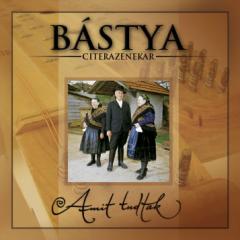|
 Bástya Citerband is the poineer of the new style citer-music, as they use leader-, tenor- and bass-citers, which are equivalent of the violin, viola and doubble-bass in folk ensembles. Due to this line-up their sound is not like a citerband’s sound, but reminds us to a string ensemble. Besides the citers they use other instruments like Moldvian drum,
Bástya Citerband is the poineer of the new style citer-music, as they use leader-, tenor- and bass-citers, which are equivalent of the violin, viola and doubble-bass in folk ensembles. Due to this line-up their sound is not like a citerband’s sound, but reminds us to a string ensemble. Besides the citers they use other instruments like Moldvian drum,
beating-wood, accordion and violin. This is the third album of Bástya Citerband. They play authentic Hungarian folk music from almost every region of the Carpathians: Szatmár, Moldva, Szilágyság, Jászság, Palócföld, the Galga basin, Mátyusföld, Drávaszög, Kalotaszeg and Eastern Slovakia. Many of these songs are the band’s own collection. There’re special moments on this album, like the well-known tune of Kodály’s ’Kállai kettős’ at the end of the folksong from Szatmár, or the famouns Gypsy song ’Csingerálás’ in the medley titled ’Elindultak a cigányok’. The arrangement from Drávaszög is recorded in it’s original Croatian language, and the song tited ’Ének az aradi vértanúkról’ is sang by the villagers themselves.
László Bata
Levente Cservenka
Zsolt Géringer
Eszter Gubucz
Péter Gubucz
István Paszicsnyuk
Péter Paszicsnyuk
Éva Tóth
Piroska Tóth
| 1. | Szatmári népzene (5:41) | | 2. | Moldvai énekek (3:05) | | 3. | Elindultak a cigányok... - Szilágyság (7:48) | | 4. | Magyarbődi csárdások - Kelet-Szlovákia (6:15) | | 5. | Kalotaszegi legényes, csárdás és szapora (6:09) | | 6. | Új stílus - Jászság (8:26) | | 7. | Miskolc felől - Palócföld (7:00) | | 8. | Délszláv népzene - Drávaszög (4:45) | | 9. | Kedvenc - Galga mente (7:02) | | 10. | Ének az aradi vértanukról - Mátyusföld (4:15) |
|
